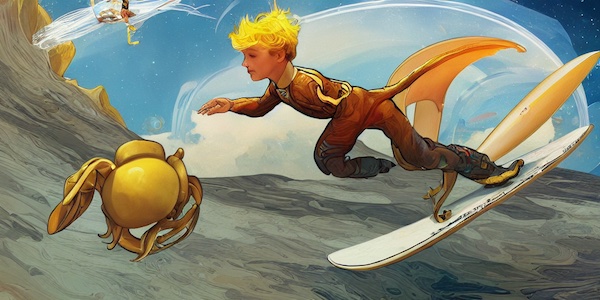Links for May 2022

- The Terrapunk Manifesto (Nasjaq) — A critical look at the Solarpunk movement, which the author argues is fundamentally about stagnation, promoted as harmony. Terrapunk is a more progress-centric bouquet of beliefs, with an emphasis on human ingenuity, nuclear energy, and a multi-planetary future.
- Elon Musk Is Acting Like Henry Ford (Bloomberg) — After his initial success, Henry Ford purchased a failing newspaper and promulgated his anti-semitic views, and drove a way his most capable lieutenants, replacing them with sycophants. His empire was ultimately dethroned by Alfred P. Sloan, an MIT trained engineer who eventually assumed control of GM and pioneered consumer financing. Will Musk suffer a similar fate?
- The Department Store That Was Once a Country (Ned Donovan) — Chronicles the rich history of the Hudson's Bay Company, which was given a monopoly over nearly 4 million square kilometers in modern day Canada. The corporation created a new currency: the MB (Made Beaver), fixed prices against it, outlawed private trading, and ran a psyop that their land was horrible and deadly.
- The Forgotten Stage of Human Progress (The Atlantic) — Derek Thompson continues his clarion call to implement what we’ve already invented, such as more nuclear power plants. Human progress is not just one damn breakthrough after another. It's not a neat tech tree but a messy tangle of invention, refinement, partial implementation, and political negotiation.
- When Should an Idea That Smells Like Research Be a Startup? (Ben Reinhardt) — Ben argues that venture backed startups are often not a great fit for doing research, which often takes a long and unpredictable amount of time. You either need a "money factory", or a charismatic leader to convince everybody else that there is in fact a critical path long enough to find it.
- Israel’s Watergen Provides ‘Water-From-Air’ Units to Medical Facility in Syria (Times of Israel) — The Watergen generator, powered by solar energy, converts droplets of moisture from the air into clean water. It's being trialed in Gaza to provide fresh water, since the overused acquifer has been degraded by saltwater intrusion and contaminated by pollutants.
- Just Stop Apologizing (Freddie deBoer) — deBoer points out a core hypocrisy in many progressive communities: restorative justice is embraced as a core value, yet people that transgress the norms of that community and then apologize profusely are not themselves afforded any restorative justice.
- Tyler Cowen's Approach to Leading an Intellectually Fulfilling Life (David Gasca) — Cowen is a prolific writer, podcaster, and infovore. His style of being a fox involves an insatiable curiosity, extensive travel, and in general sampling the best offerings from a variety of obscure fields.
- The Rise and Fall of World's Fairs (Smithsonian Magazine) — Tracks the evolution of world fairs from "the world's universities" in the 19th century to "sites of entertainment". In many ways, mega theme parks like Disney World EPCOT (Experimental Prototype Community of Tomorrow) are spiritual descendants of world fairs.
- Russia's “Firehose of Falsehood” Propaganda Model (RAND Corporation) — Modern Russian propaganda relies on a continuous barrage of invented and inconsistent information. It takes less time to make up facts than it does to verify them, and first impressions are very resilient. This is a wicked problem, argue the authors. Don't expect to "counter the firehose of falsehood with the squirt gun of truth".
- 103 Bits of Advice I Wish I Had Known (Kevin Kelly) — We don't usually fall for listicles, but Kevin Kelly recently turned 70 and dropped some unique 💎's.
- Interview: Ramez Naam, futurist, author, and investor (Noah Smith) — A broad ranging interview with Mez, a treasure trove of information about energy and climate and their ramifications on politics, as well as feedback loops involved. Mez also teases emerging technology, like synthetic "electrofuels" and floating wind farms.
- Why Pebble Failed (Eric Migicovsky) — Almost a decade after it failed, the CEO of a promising smartwatch company wrote a postmortem highlighting the importance of product-market fit, of having a well communicated long-term vision, and the value of a good marketing team.